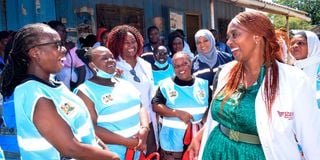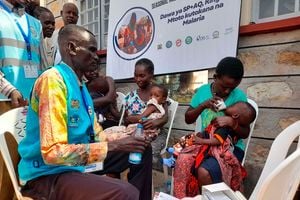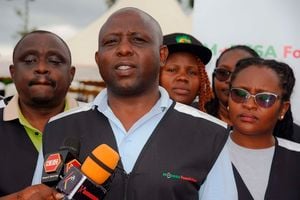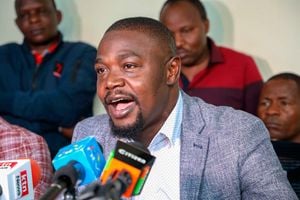
Public Health Principal Secretary Mary Muthoni (right) engages with Community Health Promoters at Kongowea Dispensary in Mombasa on August 16, 2024.
A fresh dispute has arisen between the national government and counties over who is responsible for paying Community Health Promoters (CHPs).
Previously, both levels of government had agreed to share the cost through a pooled fund. At least, 100,000 CHPs have been recruited.
However, the national government has bypassed this arrangement by directly paying CHPs through Mpesa, raising concerns about the lack of verification for work done and the overall effectiveness of the system.
In a recent consultative meeting with Health Cabinet Secretary Deborah Barasa, county officials are pushing the national government to transfer the funds as a conditional grant.
This, they said would allow counties to manage payments directly, ensuring greater accountability and oversight of community health services.
There has been growing bad blood between the Ministry of Health and governors on key matters that require implementation at the county level as county bosses have accused Health officials of running the show, and only involving them at the tail end.
The county bosses have long felt that the national government was retaining certain devolved functions, such as health, hindering the sector's delivery.
President William Ruto last year assured the governors that the national government had no interest in taking over the health function, saying instead the State would support the county governments to deliver quality and affordable healthcare to the people.
“We have a comprehensive plan on how to better address issues surrounding the welfare of medics and we want to have a seamless intergovernmental working relationship that will enable us to implement various reforms in the health sector,” Dr Ruto said.
Dr Ruto pledged to support counties’ efforts to bolster medical services.
"I also want to assure our county governments that they have our cooperation in delivering for the people of Kenya. My commitment, the commitment of the Government of Kenya is that we succeed as a nation. It doesn't matter who takes the credit, whoever wants to take the credit can do so as long as we deliver on our commitment that has been elusive for many years,” he said.
Council of Governor’s Health Committee chair Governor Muthomi Njuki in a meeting with Dr Barasa said that the best way to make the best policies was to involve the people who were going to implement them.
“Our public participation does not involve the county bosses but Mwananchi but we should not be involved. We want to be involved in creation and not at the tail end. We should be able to from the onset and come in to rubber stamp what has been discussed,” Council of Governor’s Health Committee Chair Governor Muthomi Njuki said.
“In the past, it has seemed that there was a competition between the counties and the ministry officials, how do you end makeup laws yet you don’t involve the implementers, then you just publish them and we meet in court,” Mr Njuki said.
He added that the ministry has wasted resources on unnecessary litigation. “I think the judiciary normally looks at us and wonder whether devolution was a blessing or a curse,” he says.
However, Dr Barasa said the differences witnessed between the two entities should not be a stumbling block to health services delivery, but an opportunity to come together and find lasting solutions adding that she will be seeking to turn a new leaf with the ministry’s relations with the governors as she settles in office.
The meeting between the two entities comes at a time when the CoG has consistently blamed the ministry for undermining them, formulating laws, policies and disaster responses and only involving counties in implementation.
“We need your support in CHP training. We take note that we have not been involving you. We need to mobilise the CHPs even as we do the awareness work. I have listened to you and I am happy that we are beginning to engage,” Dr Barasa said.
She said there was a need to mend the bridges and engage in terms of policy-making to ensure that there is harmony between the two levels.
On February 16, Deputy President Rigathi Gachagua launched a Sh3 billion payment for community health promoters rattling governors, with an initial agreement having settled on a payment of Sh2,500 each from the two levels.
Mr Gachagua praised the stipend rollout adding that it was meant to motivate the CHPs and recognise their vital role in the public health sector.
Notably, no governor attended the DP function at his Karen residential despite COG chairperson Anne Waiguru being invited.
The CHPs were recruited to provide primary health care, which aims to transform health services from a curative to a preventive and promotive approach.
Each visits 100 households every two to three months to provide services to all Kenyans from the comfort of their homes.
They then refer cases they can't handle to level two and three facilities. At this level, most basic screenings and tests, including weight, blood pressure, sugar levels, and other primary services, will be offered free of charge.
They will also counsel families on health improvement and disease prevention, provide basic first aid for common illnesses and minor injuries, conduct basic health screening during home visits, and refer to Level Four or Five hospitals depending on the condition of the patients.









